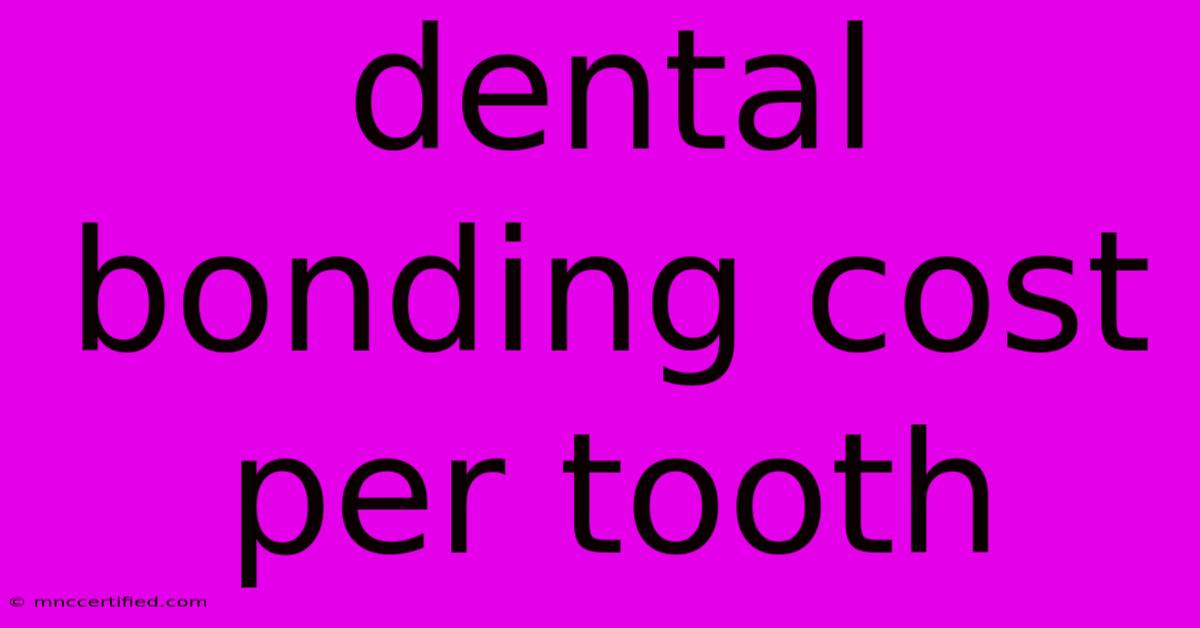Dental Bonding Cost Per Tooth

Table of Contents
Dental Bonding Cost Per Tooth: A Comprehensive Guide
Dental bonding is a popular cosmetic procedure used to improve the appearance of teeth. It's a relatively quick and affordable way to address various dental imperfections. But how much does dental bonding cost per tooth? This comprehensive guide will break down the costs, influencing factors, and what you can expect from the procedure.
Understanding Dental Bonding
Dental bonding involves applying a tooth-colored resin material to the surface of a tooth. This resin is then sculpted and hardened with a special light, seamlessly blending with your natural teeth. It's a versatile procedure used to:
- Repair chipped or cracked teeth: Bonding can effectively repair minor chips and cracks, restoring the tooth's integrity and aesthetics.
- Close gaps between teeth: Small spaces between teeth (diastema) can be subtly closed using bonding.
- Improve the shape and size of teeth: Bonding can be used to reshape teeth that are uneven or irregularly sized.
- Whiten discolored teeth: While not a replacement for professional whitening, bonding can lighten the color of a single discolored tooth.
How Much Does Dental Bonding Cost Per Tooth?
The cost of dental bonding per tooth varies significantly depending on several factors. A precise quote can only be provided by your dentist after a thorough examination. However, you can expect a range of $100 to $500 per tooth. This wide range is due to:
Factors Affecting the Cost of Dental Bonding:
- The dentist's experience and location: Dentists in urban areas or with specialized expertise in cosmetic dentistry may charge more than those in rural areas or with less experience.
- The extent of the repair: Minor repairs, such as fixing a small chip, will typically cost less than more extensive procedures, such as closing a significant gap between teeth or reshaping a severely damaged tooth.
- The number of teeth being bonded: While the cost per tooth might seem consistent, dentists may offer slight discounts for multiple teeth bonding.
- Insurance coverage: Dental insurance plans vary widely. Some may cover part of the cost, particularly if the bonding is considered medically necessary (e.g., to repair a fractured tooth). Always check your policy details.
Breaking Down the Costs:
The total cost includes the materials (resin, bonding agents), the dentist's time and expertise, and any necessary preparatory work (such as cleaning or minor tooth preparation).
Finding Affordable Dental Bonding:
While the cost of dental bonding can vary, there are ways to find affordable options:
- Shop around: Get quotes from multiple dentists in your area. This allows you to compare prices and services.
- Look for dental financing options: Many dental practices offer payment plans or work with financing companies to make the procedure more accessible.
- Ask about discounts: Inquire about discounts for multiple procedures or cash payments.
- Consider less extensive procedures: If you only need minor repairs, explore if bonding is the most cost-effective option; alternative, less expensive, treatments might be available.
Maintaining Your Bonded Teeth:
Proper aftercare is crucial for the longevity of dental bonding. Follow your dentist's instructions carefully. Generally, this includes:
- Good oral hygiene: Maintain a consistent routine of brushing and flossing.
- Avoiding stain-causing substances: Limit consumption of coffee, tea, red wine, and tobacco.
- Regular dental checkups: Attend regular checkups to monitor the health of your bonded teeth.
Conclusion:
Dental bonding is a worthwhile investment for improving the appearance of your smile. Although the cost per tooth can vary, understanding the factors that influence the price and researching different dentists can help you find an affordable and reputable option. Remember to prioritize your oral health and follow your dentist’s recommendations for aftercare to ensure the long-term success of your bonding treatment. Don't hesitate to ask your dentist any questions you have about the procedure and cost before proceeding.

Thank you for visiting our website wich cover about Dental Bonding Cost Per Tooth. We hope the information provided has been useful to you. Feel free to contact us if you have any questions or need further assistance. See you next time and dont miss to bookmark.
Featured Posts
-
Dee Devlin Addresses Conor Mc Gregor Romance
Nov 28, 2024
-
Stellantis Cheshire Site Survives Cuts
Nov 28, 2024
-
Futures Trading Strategies Pdf
Nov 28, 2024
-
Tiger Woods Golf Trading Cards
Nov 28, 2024
-
Train Cancellations Due To Storm Conall Warning
Nov 28, 2024